Understanding the Nafs in Islamic Studies
1/154
There's no tags or description
Looks like no tags are added yet.
Name | Mastery | Learn | Test | Matching | Spaced |
|---|
No study sessions yet.
155 Terms
What is required to attain self-revolution according to Islamic studies?
Limiting distractions and prioritizing.
What is the difference between self-centric and god-centric perspectives?
Self-centric focuses on one portion of reality, while god-centric encompasses all portions.
What does 'anti auto pilot mode' refer to in Islamic practice?
Conducting activities consciously rather than mindlessly, ensuring worship is for God.
What is 'Eemaan' in the context of Islamic studies?
Affirmation and deeds of the heart that come from true believers.
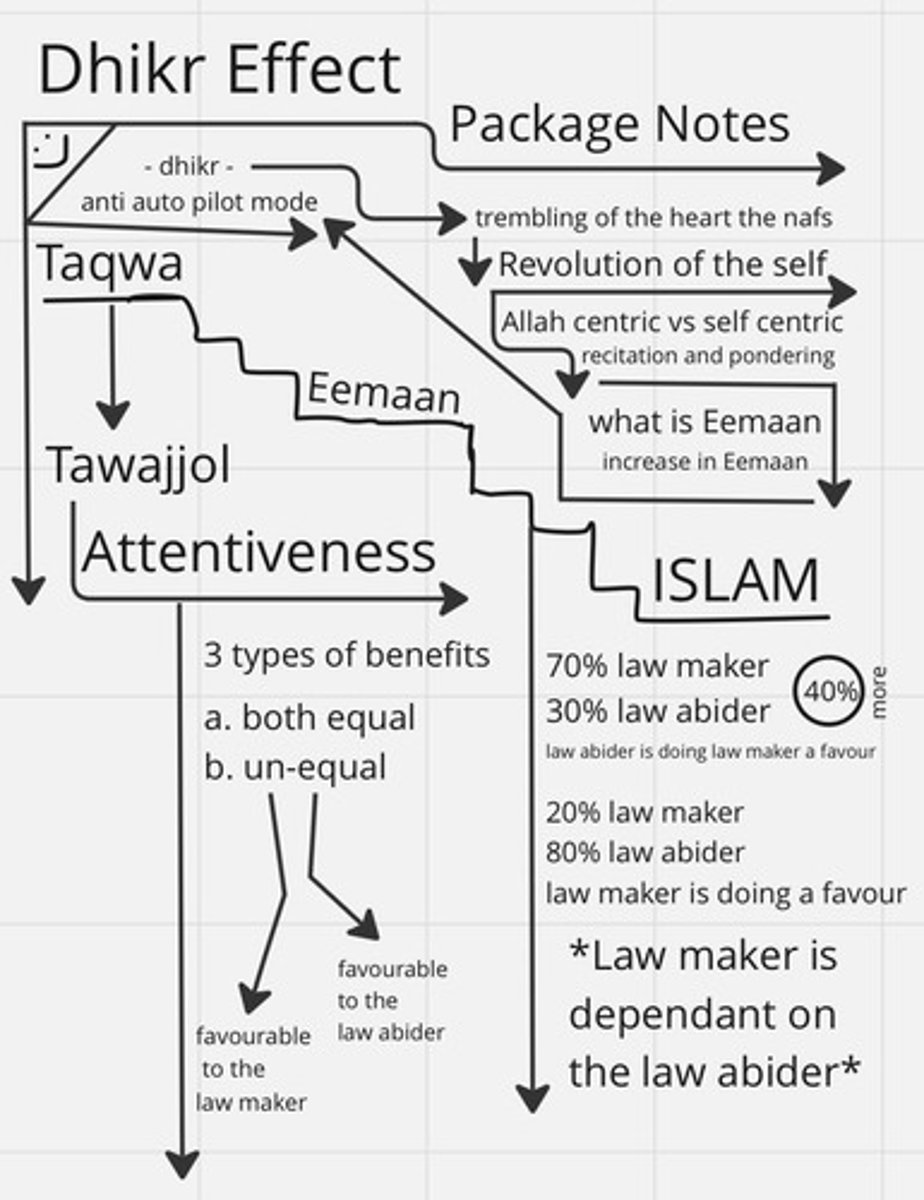
What is the focus of Unit One in the Islamic Studies course?
Understanding ourselves.
What are the four faculties of mankind discussed in Unit C1?
Physical, intellect, emotion, and spiritual.
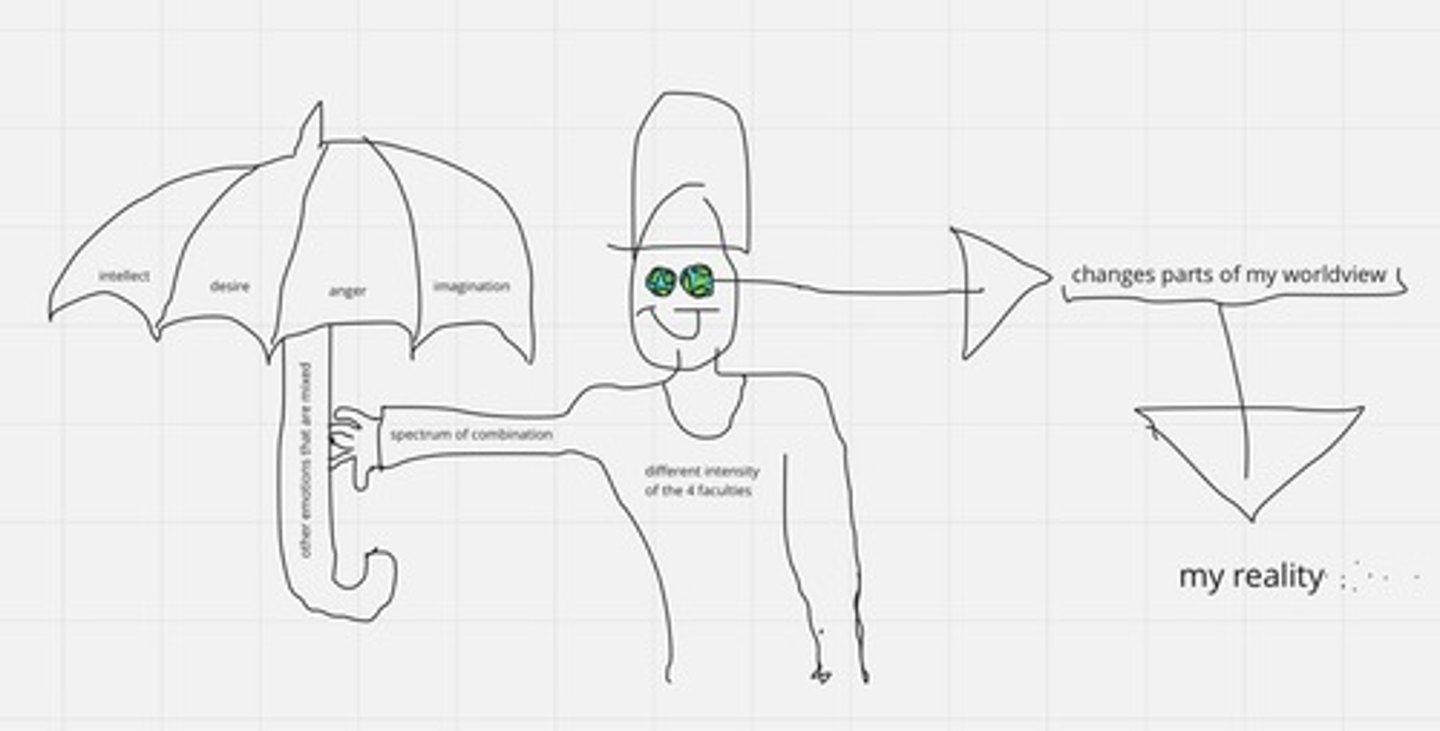
What is the role of tools in understanding ourselves according to the notes?
Tools must have the capacity for the task at hand and can be mediums or personal experiences.
What are the three types of 'nafs' mentioned in the notes?
Mutmainnah, lawammah, and ammarah.
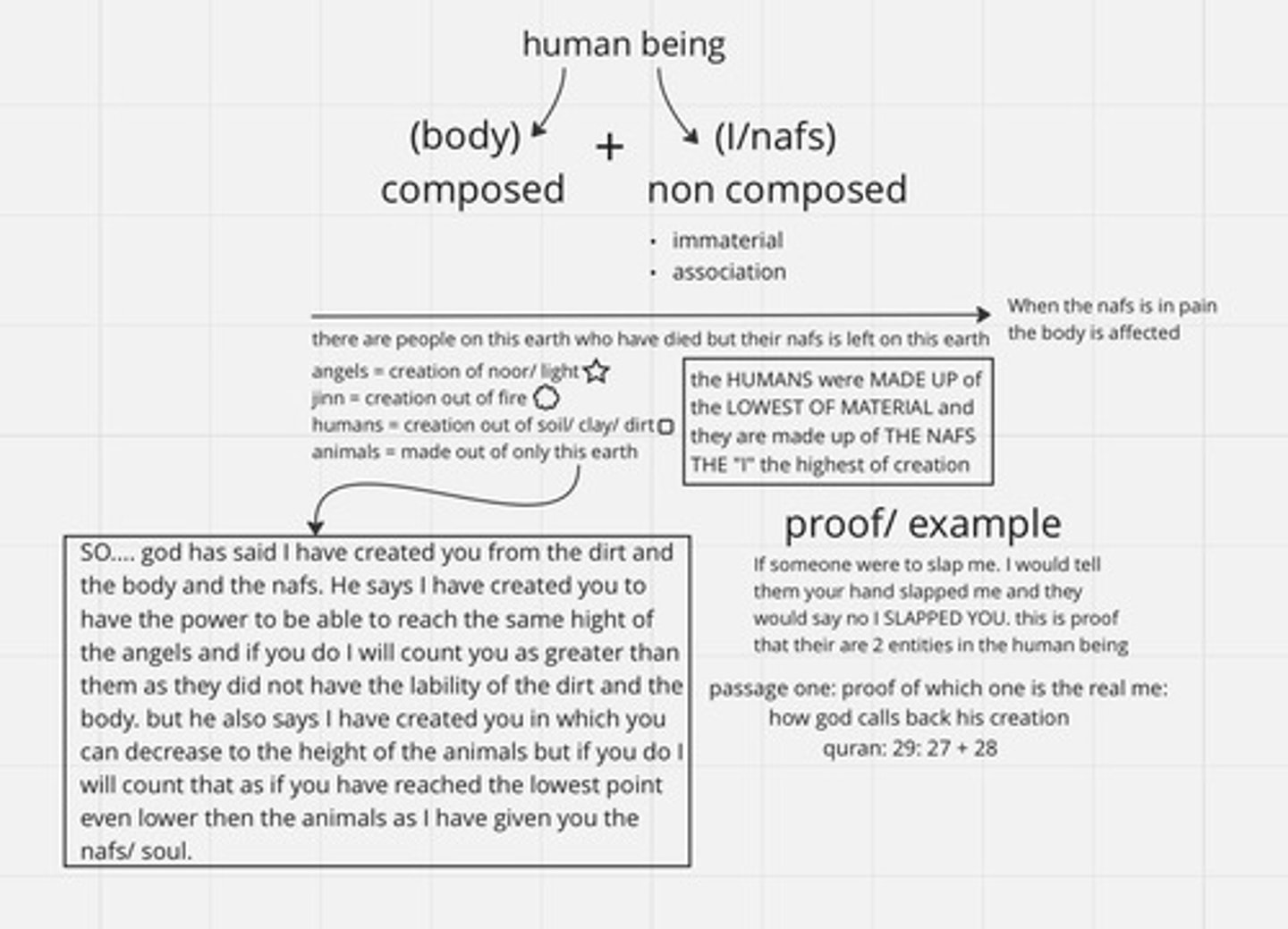
What are the four major faculties that serve as tools for betterment?
Anger, desire, imagination, and intellect.
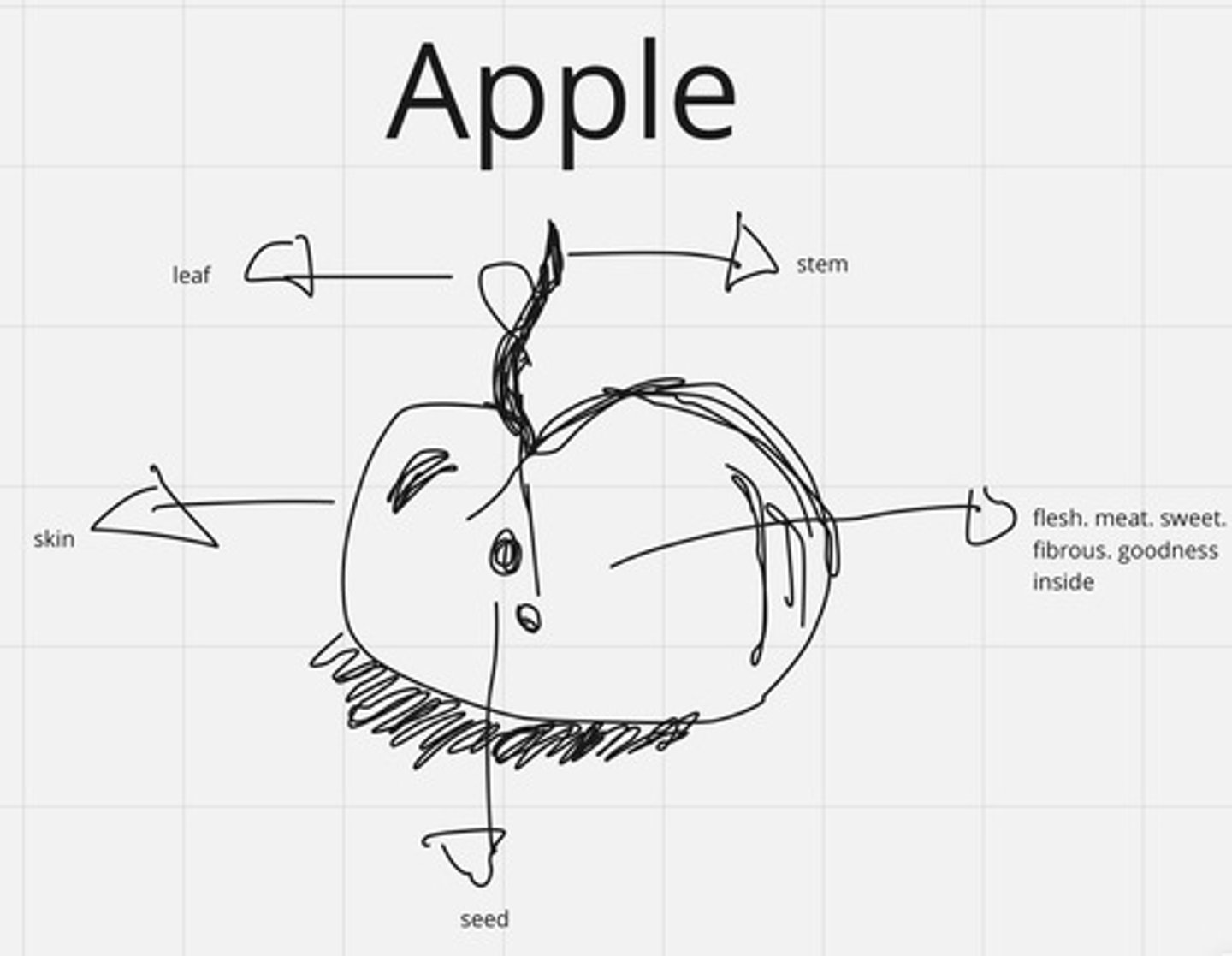
What is the significance of finance according to the notes?
Finance is not a need but a tool to achieve or attain needs.
What is 'tafheem' and how is it achieved?
Incorporating knowledge into the soul through repetition (takraar).
What does the verse 'deaf, dumb (and) blind, so they will not turn back' (2:18) imply?
It suggests a state of being unresponsive to guidance.
What is the difference between naqlee and aaqlee proofs?
Naqlee refers to written proof (e.g., Quran, Hadith), while aaqlee refers to intellectual proof.
What is the significance of the 'tools of measure' in Unit C1?
They help in understanding who we are and how we learn.
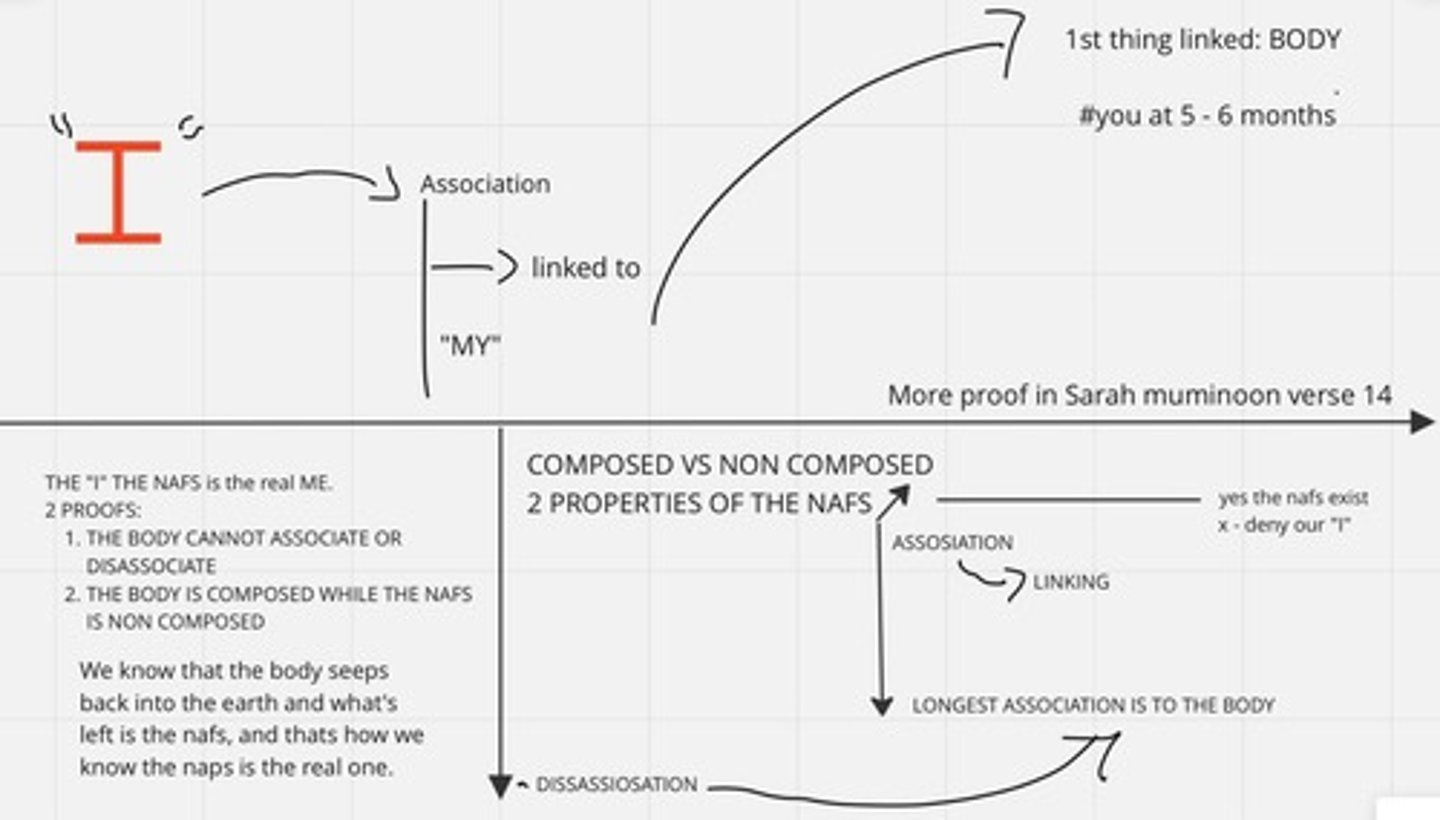
What are the needs of the physical faculty according to the notes?
Food, water, shelter, and protection.
What are the emotional needs outlined in the notes?
Respect, happiness, love, and the need to be understood.
What does the term 'composed vs non-composed realities' refer to in Unit C2?
It pertains to the understanding of the real self in relation to intellectual and textual evidence.
What is the importance of the intellect in Islamic studies?
It is seen as having capacities that are dependent on God.
How does one achieve a deeper understanding of the nafs?
Through exploration of its immaterial aspects and faculties.
What is the role of repetition (takraar) in learning?
It is a method to reinforce understanding and incorporate knowledge into the soul.
What is the significance of the verse 23:14 in the context of the notes?
It serves as a Quranic proof related to the themes discussed in the course.
What does the term 'aqli' refer to in the context of the notes?
It pertains to intellectual understanding and composed realities.
What does success mean in this world according to the notes?
Attaining jannah (paradise) and purifying the soul.
What is considered a failure in the context of the notes?
Corruption of the soul.
How is success attained according to the notes?
By being a thinker rather than just a doer.
What is the relationship between effort in studies and grades?
The more effort you put into studies, the better your grades will be.
What happens to grades with less effort in studies?
The less effort you put in, the worse your grades will be.
What is the implication of doubling length while keeping the same area?
The width would have to be halved.
How does the amount of gunpowder affect destruction?
The more gunpowder used, the bigger the destruction.
What is the effect of using auto-pilot mode on success?
The less the auto-pilot mode, the higher the success.
What does switching to anti-auto-pilot mode imply?
Increasing anti-auto-pilot mode leads to increased success.
What is the consequence of decreasing the purification of the soul?
The corruption of the soul will increase.
What is the consequence of increasing the purification of the soul?
The corruption of the soul will decrease.
Who are considered enemies in the context of success?
Those who want us to be doers and not thinkers.
What is the significance of Iblis in the notes?
Iblis was elevated through worship and hard work despite being in a lower realm.
What are composed realities according to the notes?
Realities that can be broken down into parts, like an apple.
What are non-composed realities?
Realities that cannot be broken down into parts, like love.
What is a key quality of the 'I'?
The ability to form associates.
What is the relationship between the 'I' and the body?
The body is an associate of the 'I'.
What are the parts of the nafs mentioned in the notes?
Ruh (spirit) and qalb (heart).
What can change in non-composed realities?
Only the intensity can change, not the parts.
What are the three fundamental beliefs in CCUsool - E - deen?
1. Belief in the oneness of God, 2. Prophethood of Muhammad as the last prophet, 3. Day of judgment/resurrection.
What will be questioned on the Day of Judgment according to the notes?
The nafs (the 'I') will be questioned, not the body.
What does the passage 82:18 + 19 signify about the nafs?
It indicates that the nafs is the real entity that exists on the Day of Judgment.
What does the passage 81:12 + 14 discuss regarding the nafs?
It emphasizes that the nafs has a reality and will be questioned on the Day of Resurrection.
What does the term 'nafs' refer to in the context of the notes?
The nafs refers to the soul or self, which has various levels and is significant in discussions of purification and corruption.
What are the two extremes of the nafs as described in the notes?
The nafs can be so grand that God calls it directly, or so weak that it has no command over others.
What significant event is mentioned regarding the imam and his sword?
The imam put his sword away when he heard a voice saying he had fulfilled his duty and should return to God, after defeating 500 men.
What metaphor is used to describe the nafs in relation to decisions?
The nafs is compared to a tool that can be used for good or bad, depending on how it is utilized.
What are the two outcomes of the nafs based on decisions made?
Corruption leads to bad decisions, while purity and success result from good decisions.
What is the significance of the purification of the nafs?
Purification of the soul is crucial for achieving success, and it involves understanding the tools God has provided for this purpose.
What does the parable in Surah Zumar (39:29) illustrate?
It illustrates the difference between a slave owned by multiple quarrelsome masters and one owned by a single master, emphasizing the confusion of serving many versus the clarity of serving one.
Why do we obey God according to the notes?
We obey God out of humility and desire, recognizing how He treats us.
What role does the Prophet play in relation to obedience?
The Prophet serves as a role model and helps us understand how to act and avoid creating our own rules.
What are immaterial objects as defined in the notes?
Immaterial objects include thoughts, values of words/actions, feelings, anger, hunger, and happiness.
What are material objects according to the notes?
Material objects include tangible items like a purse, stone, book, pen, feather, shirt, metal bar, water bottle, and backpack.
How can material objects be measured?
Material objects can only be measured with other material objects.
What is the relationship between the nafs and the physical body?
The nafs and the physical body work hand in hand in a give-and-take relationship.
What is the importance of asking ourselves about the purification of the nafs?
It is essential to reflect on how to achieve purification and what tools are available to us.
What does the note suggest about the nature of innate feelings?
Innate feelings are described as a dim light that is constantly adjusted or fluctuates.
What does the concept of 'success' relate to in the context of the nafs?
Success relates to making good decisions and purifying the nafs.
What does 'corruption' signify in the context of the nafs?
Corruption signifies making bad decisions that lead to the degradation of the nafs.
What is the significance of the phrase 'the nafs is not a small creation'?
It emphasizes the complexity and importance of the nafs in spiritual and moral discussions.
What is the purpose of understanding the tools God has provided for purification?
Understanding these tools helps individuals learn how to effectively purify their souls.
What does the note imply about the criteria for success and failure?
Success and failure are determined by the purification or corruption of the nafs, which can vary between earthly and heavenly contexts.
What question do the notes encourage individuals to ask themselves regarding the nafs?
Individuals are encouraged to ask what tools God has provided for purifying their nafs.
What is the command 'Wa Sare ou' directed towards?
It is a command to the masses to SPEED UP.
How does the concept of capacity relate to human needs?
Capacity can limit us or push us beyond our limits, affecting our pursuit of needs.
What is the difference between being limited and going over the edge in terms of capacity?
Being limited means underestimating one's ability (e.g., thinking you can only do 5 push-ups when you can do 20), while going over the edge means overestimating (e.g., thinking you can do 5000 push-ups when you can only do 50).
How is the pursuit of spiritual needs described?
It is a natural inclination, and we pursue it based on our understanding of our capacity.
What happens when we give in to cravings according to the notes?
Giving in to cravings creates an 'elevator effect,' causing the craving to rise.
What extreme actions might someone take to fulfill a perceived need?
They may resort to actions like killing, smuggling, stealing, or human trafficking.
How does perceived reality influence actions?
Perceived reality builds on one's worldview, which leads to actions taken to fulfill those perceived needs.
What does the example of needing 5 bars of chocolate an hour illustrate?
It illustrates the discrepancy between perceived needs and actual needs, as the reality may be needing only one bar a year.
What analogy is used to explain the balance of needs?
The analogy of a projector: even if all needs are at their extreme, balance is disrupted, similar to how a projector cannot display properly at full brightness.
What is the significance of Allah's direction in fulfilling needs?
Allah provides guidance towards fulfilling needs, indicating a higher understanding of what is necessary.
What does 'Kafara' mean in the context of needs?
Kafara means to cover or deny the existence of something, like hiding stolen items.
What does the term 'Satara' imply?
Satara means to cover something that is known but not visible, such as hiding physical signs of fatigue.
What is the consequence of an adult being unaware of their physical needs?
They may set their physical needs too high, leading to disasters in fulfilling other needs.
What does the phrase 'our capacity to determine needs is low' imply?
It suggests that individuals often misjudge their actual needs and capacities.
How does understanding one's capacity affect the pursuit of needs?
A better understanding of capacity can lead to more realistic and balanced approaches to fulfilling needs.
What is the relationship between needs and chaos according to the notes?
When perceived needs are extreme, it can create chaos and imbalance in fulfilling other needs.
What does the term 'Illah' refer to in the context of human needs?
Illah refers to the natural inclination of all beings towards fulfilling their needs as determined by their capacity.
How does the analogy of light and projectors relate to the fulfillment of needs?
It illustrates that even if all needs are maximized, without proper balance, fulfillment cannot be achieved effectively.
What does the term 'deaf, dumb (and) blind' signify in the context of Kafara?
It signifies a state of denial about one's needs or actions, preventing one from turning back to the right path.
What is the impact of cravings on our understanding of needs?
Cravings can distort our understanding of actual needs, leading to extreme actions to satisfy them.
What does the term 'capacity' encompass in the context of fulfilling needs?
Capacity encompasses both physical and psychological limits that influence how we pursue and fulfill our needs.
What does the root word 'Ghafar' mean?
To cover.
How does God cover our mistakes according to the notes?
In a way that looks as though there was no damage in the first place.
What is an example given for God's covering of mistakes?
Getting stitches, which leave no trace behind.
What does God encourage us to do regarding forgiveness?
To rush towards forgiveness.
What is the relationship between obeying God and removing deficiencies?
Obeying the deen sets the foundation for the cause that creates the effect of removing deficiencies.
What are the three meanings of 'Rab' discussed in the notes?
Nurturer, sustainer, flourisher.
What does 'sustainer' refer to in the context of the notes?
To sustain someone or to maintain, such as how our parents sustain us.
What does 'nurturer' imply in the context of God's traits?
To give.
How does God demonstrate that He is aware of our difficult life situations?
By being our flourisher, even in tough times.
What is the significance of the month of Ramadan according to the notes?
It is the perfect month to fulfill our physical, spiritual, emotional, and intellectual needs.
What causes deficiencies in our lives as mentioned in the notes?
Not following the deen or lacking understanding of what we are following.
What is the reality of Jannah (heaven) as described in the notes?
It is a real and living experience that occurs when man willingly obeys his Rab.
How should we view Jannah and Jahannam (hell) according to the notes?
Not just in the context of the hereafter, but also as pure feelings experienced in this life.